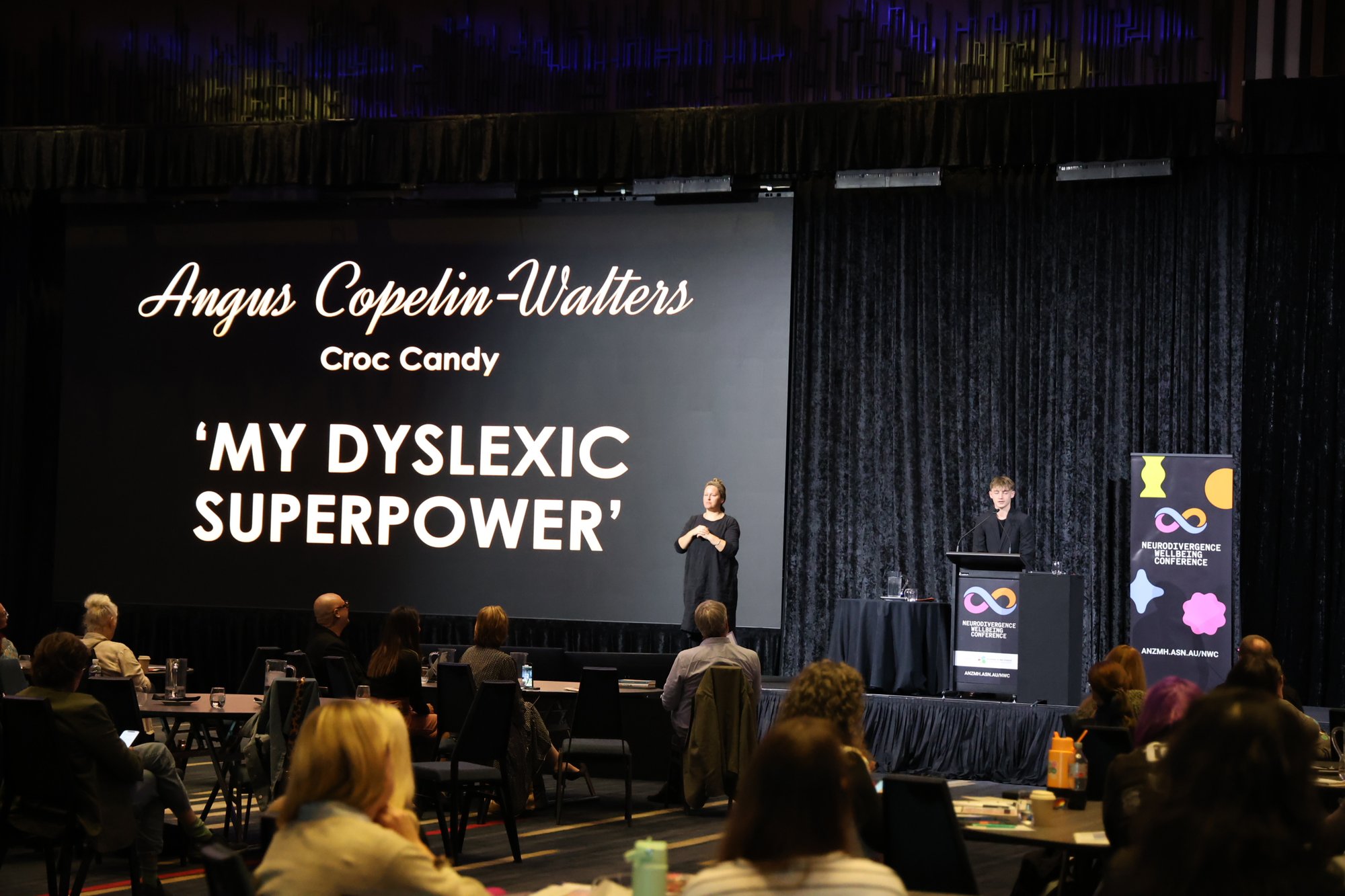Have Your Say at NWC26
Call for Presenters Now Open
Are you a neurodivergent leader, researcher, clinician, educator, lived experience or advocate shaping the future of wellbeing and inclusion?
Presenting at the Neurodivergence Wellbeing Conference gives you a platform to share your work, connect with peers, and inspire meaningful change.
Apply to Present
Why Present at NWC26
- Share your research, programs, and insights with a diverse audience of professionals, advocates, and decision-makers.
- Contribute to the future of neurodivergent wellbeing through your lived experience, academic research, or professional expertise.
- Strengthen your public speaking and leadership profile while connecting with peers in your field.
- Inspire and empower others through storytelling, case studies, and evidence-based practice.
- Gain access to the full conference experience with a discounted registration rate exclusive to accepted presenters.
- Receive a personalised certificate of presentation for CPD and professional recognition.

Presentation Opportunities
The NWC26 program features a range of presentation opportunities designed to highlight diverse voices and expertise, including:
- Community Presenters (10–30 minutes, with presenters speaking on one of the topics concurrently)
- Workshops (60-minute interactive or skill-based sessions)
- Poster Display (research or project overviews)
Successful applicants of these three presentation types will be invited to present or display in person at NWC26 and receive a reduced conference registration rate.
Keynote Presenters
Keynote sessions are selected separately and feature invited speakers recognised as leaders in the neurodivergent wellbeing space. If you wish to express interest in being considered for a keynote opportunity, please contact our team directly.
Important Dates
| Presentation applications open | Tuesday 16 December 2025 |
| Presentation applications close | Friday 13 March 2026 |
| Notifications to presenters | Monday 13 April 2026 |
| Acceptances and registrations due | Monday 27 April 2026 |
| Program launch | Thursday 30 April 2026 |
| Conference dates | Mon 28 - Tues 29 September 2026 |
Presentation Styles
Oral Presentation
Workshop
Panel Presentation
Poster Presentation
The NWC26 Program
From Insight to Impact: Cultivating the Future of Neurodivergent Wellbeing celebrating Diversity. Redefining Inclusion. Reimagining Belonging.
NWC26 Topics
Click to expand.
1. Language, Identity & the Neurodivergent Paradigm
Language shapes how neurodivergence is understood, supported, and lived. This topic explores the power of words, diagnosis, and self-identification—how they influence belonging, stigma, and wellbeing. Delegates will unpack the shift from deficit-based models to neuro-affirming paradigms that empower both practitioners and the people they serve.
2. Intersections of Identity & Identity-Affirming Care: Culture, Gender, Sexuality & More
Systems can either enable or restrict neurodivergent wellbeing. This topic examines how education, justice, welfare, and healthcare structures impact access, inclusion, and outcomes for neurodivergent individuals. Sessions will explore strategies for systemic reform, trauma-informed policy, and inter-agency collaboration that create environments where neurodivergent people can thrive.
3. Systems of Influence: Education, Justice & Wellbeing
Systems can either enable or restrict neurodivergent wellbeing. This topic examines how education, justice, welfare, and healthcare structures impact access, inclusion, and outcomes for neurodivergent individuals. Sessions will explore strategies for systemic reform, trauma-informed policy, and inter-agency collaboration that create environments where neurodivergent people can thrive.
4. Neurodivergence Across the Lifespan
Neurodivergent experiences evolve over time, intersecting with key developmental, hormonal, and life transitions. This topic highlights approaches that support thriving from early childhood through ageing — ensuring that care, education, and employment pathways remain affirming, adaptive, and inclusive at every stage of life.
5. Lived Experience Leadership & Storytelling for Change
Real progress in neurodivergent wellbeing begins when lived experience leads. This topic centres neurodivergent voices as co-creators of research, practice, and policy, exploring storytelling as a form of knowledge, advocacy, and reform. It embraces epistemological pluralism — recognising diverse ways of knowing and communicating lived experience — and celebrates community connection, belonging, and the power of shared narrative. Sessions will also explore what neurodivergent leadership means in practice, challenging neurotypical assumptions and redefining leadership through lived experience.
6. Neurodivergence, Complexity, Co-occurrence & Wellbeing
Neurodivergent experiences and wellbeing often intersect in complex and interdependent ways. This topic reframes co-occurrence through a neuro-affirming lens, focusing on regulation, resilience, and recovery. Sessions explore how to reduce stigma, understand burnout, and support emotional wellbeing through trauma-informed, inclusive approaches.
7. Neuro-affirming Practice & Therapeutic Advancement
As practice evolves, so must therapy. This topic brings together evidence-informed and creative approaches that respect neurodivergent experience. It highlights innovations in psychotherapy, somatic and sensory work, and integrative health — helping practitioners move beyond adaptation toward true affirmation. Discussions will also address iatrogenic harm and explore how to bridge the gap between emerging research and real-world therapeutic practice.
8. Inclusion & Affirming Environments: Schools, Workplaces and Communities
Inclusion is more than accommodation — it’s cultural redesign. This topic explores how schools, workplaces, and community spaces can create affirming environments that promote genuine access, participation, and belonging. Through leadership, universal design, and collaborative practice, delegates will consider how systems can evolve to support all forms of neurodivergence.
9. Relationships, Sexuality & Family Life
Inclusion is more than accommodation — it’s cultural redesign. This topic explores how schools, workplaces, and community spaces can create affirming environments that promote genuine access, participation, and belonging. Through leadership, universal design, and collaborative practice, delegates will consider how systems can evolve to support all forms of neurodivergence.
10. Research, Innovation & Policy for Change
Inclusion is more than accommodation — it’s cultural redesign. This topic explores how schools, workplaces, and community spaces can create affirming environments that promote genuine access, participation, and belonging. Through leadership, universal design, and collaborative practice, delegates will consider how systems can evolve to support all forms of neurodivergence.